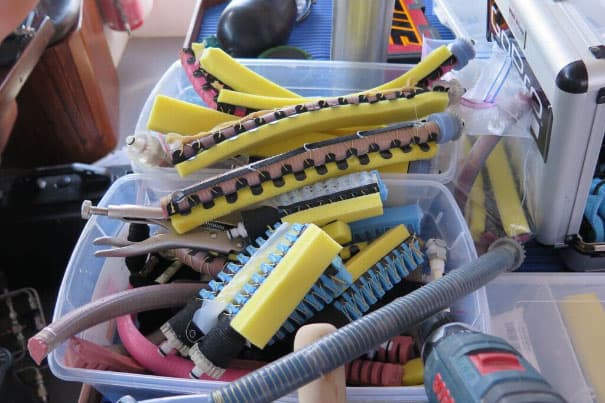Harvard Researcher Helps In Deep Sea Exploration By Giving Robots The Sensitive Touch
David Gruber, a marine biologist of Baruch College, who first discovered the biofluorescent sea turtle in Solomon Islands, has now resurfaced in connection with robotics. Together with Harvard roboticist Robert Wood and sponsored by National Geographic Innovation Challenge Grant, he has devised humane fingers to robots. These squishy fingers are tender so that the sensitive coral samples they pull out of water are not damaged.

In order to understand the characteristics of marine life such as corals and reef from deep under, David needed samples. As most of these indigenous species grow at depths divers can’t reach, researchers use remotely operated robots to fetch the samples for them. But what concerned David was the robots they used had very rigid hands and fingers that were more suited to grab tough material like pipelines and not meant for tender living organism. They were more disruptive of the coral reef.
The biggest challenge in fabricating such delicate, flexible fingers for this purpose was the dimensions vary based on the sample’s size. The fingers had to be adaptable. The duo have succeeded in creating two types of flexible fingers for these deep-sea robots. One is like a tentacle that coils around the reef to grip it, and another with a pair of bending fingers resembling forceps, which is ideal to pick up irregularly shaped samples.
They are also planning on embedding sensors on the squishy fingers so that researchers can actually feel the strength of the grip in addition to the visual aid provided by the cameras. Biologists too hope to take it to the next level by using them to conduct tests right on the sea bed instead of bringing the samples back to a lab. This way, the organisms will be in their natural environment and not subject to any stress, which will uncover their natural characteristics.
The Harvard Office of Technology Development has applied to patent this technology because it is believed that these squishy fingers can be mass-produced at low costs, and have far wider application than just marine biology.
Source: #-Link-Snipped-# | #-Link-Snipped-#

In order to understand the characteristics of marine life such as corals and reef from deep under, David needed samples. As most of these indigenous species grow at depths divers can’t reach, researchers use remotely operated robots to fetch the samples for them. But what concerned David was the robots they used had very rigid hands and fingers that were more suited to grab tough material like pipelines and not meant for tender living organism. They were more disruptive of the coral reef.
The biggest challenge in fabricating such delicate, flexible fingers for this purpose was the dimensions vary based on the sample’s size. The fingers had to be adaptable. The duo have succeeded in creating two types of flexible fingers for these deep-sea robots. One is like a tentacle that coils around the reef to grip it, and another with a pair of bending fingers resembling forceps, which is ideal to pick up irregularly shaped samples.
They are also planning on embedding sensors on the squishy fingers so that researchers can actually feel the strength of the grip in addition to the visual aid provided by the cameras. Biologists too hope to take it to the next level by using them to conduct tests right on the sea bed instead of bringing the samples back to a lab. This way, the organisms will be in their natural environment and not subject to any stress, which will uncover their natural characteristics.
The Harvard Office of Technology Development has applied to patent this technology because it is believed that these squishy fingers can be mass-produced at low costs, and have far wider application than just marine biology.
Source: #-Link-Snipped-# | #-Link-Snipped-#
0
